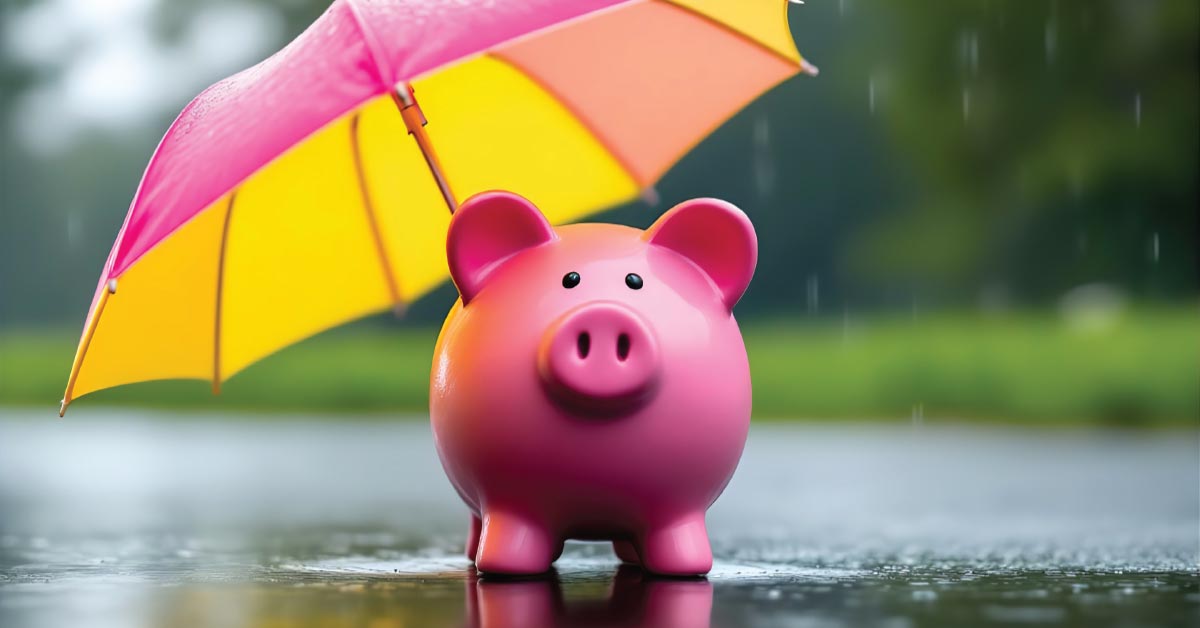Life throws us curveballs, whether it's job loss, a medical bill you didn't see coming, or a heater that quits in the middle of January. When you're blindsided by misfortune, having a financial cushion can mean the difference between stress and security. That's where your emergency fund comes in.
"None of us plans for a job loss or injury," said Melissa Stewart, CFP®, Founder and Senior Financial Advisor at Clear Vista Advisors. "If you're forced to put those expenses on a credit card or take out a loan, there's no guarantee you'll be able to make the payments. An emergency fund gives you breathing room."
HOW MUCH IS ENOUGH?
You've likely heard the rule of thumb: stash away three to six months' worth of expenses. But that's a big range—how do you know what's right for you?
"If there are two equal earners in the household, you can lean toward three months," Stewart explained. "But if one person is the primary breadwinner, aim for six months. That way, if they lose their job or get injured, your family can still cover the essentials."
In times of economic uncertainty—or if you sense layoffs could be looming—she recommends taking a closer look. "Tighten the budget, find ways to save more, and build that cushion. Even knowing you have six months of expenses saved can help you sleep better at night."
A SMART WAY TO SAVE
Building a robust emergency fund takes discipline, but Stewart has a clever hack to help make the money harder to touch.
"Open a savings account at a bank you don't normally use, and don't get a debit card or anything else for it. You want to only be able to access it by walking into the bank," she advised. "Then set up a direct deposit from your paycheck, so a small amount goes into that account automatically. You'll be building savings without thinking about it."
EMERGENCIES VS. INCONVENIENCES
So what does qualify as an emergency? "A true emergency is something unexpected that you don't have time to save for," Stewart said. Tap into your fund for things like a surprise medical bill or your car needing a new transmission.
Vacations or a new dress for a wedding? Those are financial inconveniences. "If you can see it coming, you can save for it," she added.
KEEP IT SAFE AND ACCESSIBLE
An emergency fund should be easy to access, so it's available when you need it. "Liquidity is essential," Stewart emphasized.
High-yield savings accounts, CDs with short terms, or money market accounts are all good options. "Just be sure to check with your bank regarding their early withdrawal terms and penalties on CDs," she cautioned.
WHAT IF YOU'RE SAVING FOR EVERYTHING?
Many families feel the tug between building an emergency fund and saving for retirement, college, or paying off debt. Stewart recommends tackling it in stages.
"Start by saving at least $1,000—just to get a basic cushion," she said. "Then focus on paying down any high-interest debt, like credit cards. After that, build your emergency fund up to that three-to-six-month target. Once that's in place, shift focus to retirement and other goals."
Dave Ramsey's baby steps offer a simple roadmap. Whether or not you're a fan, the approach is a tried-and-true way to build financial stability.
GET THE KIDS INVOLVED
Teaching kids about emergency funds—even for life's little surprises—can help them develop financial literacy and set them up for lifelong success.
For younger kids, Stewart recommended the classic three-jar system: give, save, spend. When they earn an allowance, have them dedicate some of each payment to each jar. "It teaches good habits early," she said.
When it comes to teens, the stakes go up a bit. "If they're responsible for their car insurance, gas, or cell phone bill, they also need an emergency fund," said Stewart. "If they lose their job or their phone breaks, they need to have money saved to handle it."
PEACE OF MIND, ONE DEPOSIT AT A TIME
Building an emergency fund may not be glamorous—but it's one of the most important, fundamental things you can do for your family. It's a financial safety net, a stress reducer, and a reminder that you're ready for whatever life throws your way.
Kirsetin Morello is a Michigan-based author, speaker, writer, travel-lover, wife and grateful mom of three boys. Read more about her at www.KirsetinMorello.com.
This article originally appeared in the Jun/Jul '25 issue of West Michigan Woman.




